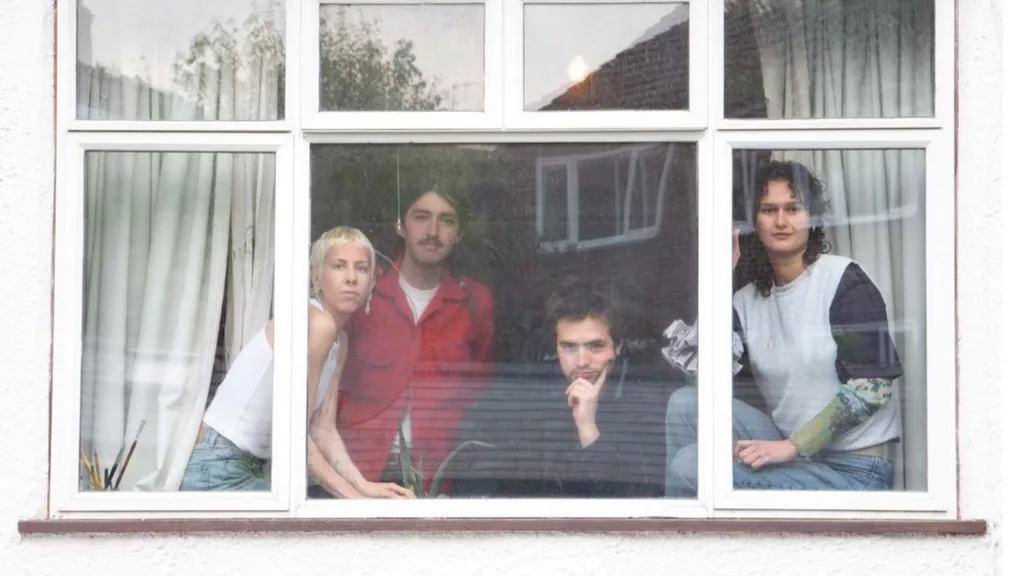Explaining the meaning of an umlaut is always a great party trick, at least to the person explaining. It’s the two dots on top of a ‘U’ that’s sometimes used for phonetic purposes in German, a la Nietzsche’s ‘Übermensch.’ The reason why the 4-piece London-based electronic art-pop band The Umlauts chose it, though, is probably because they sing in German. Well, technically, they utilize a mix of languages, including German, French, English, Italian, and whatever the aliens call the electronic noises this band conjures. The principal songwriting duo of Alfred Lear and Oliver Offord synthesized their sound in Gloucestershire, England, before bringing in Annabelle Mödlinger and Maria Vittoria as lyricists and vocalists to create the multilingual behemoth that is The Umlauts. Their debut album Slags is actually a blend of their first two EPs, complemented by a slew of new tracks. Listening through their projects chronologically highlights the band’s journey to becoming more confident in their sound, alongside their adventurous forays into experimental escapades.
The menacing crescendo of “Energy Plan,” the first song on this 10-track megalodon, draws the listener in with a sense of ominous unease before giving way to a rainbow of electronic stabs. All overlaid by a vocal motif repeating “Energy plan for the Western man”—perhaps a dig at the patriarchy, as the German translation does little to convey the meaning. Bathed in an industrial rock haze, the track’s grinding gears and motor whirs would make Trent Reznor smile—if he’s capable of that. The mechanical leitmotif continues unabated on “Dance & Go,” which also lives true to its name as it’s eminently dancey (think Yard Act with 100 more synths). While a recurrent percussion pattern swings away, an array of twisted sine waves and distorted guitar riffs play peek-a-boo with lyrics that echo the song’s title. Close your eyes, and you’re in a warehouse tripping on the strobes, hoping the cops don’t show up.
There’s a psychotropic undertone to the music of this collective, like a Boiler Room set without the pretension. For example, you can actually dance to their music, which is evident with “Frightened,” the third track on the album. Like a kiss from a lover, French is on the menu, with the singers exclaiming, “T’as vu la mouche? / Tu m’portes du mal (Did you see the fly? / You hurt me).” An ‘achtung’ goes off in the listener’s brain as the language switches seamlessly to German. “Versuche, bestrafung / … / verzagen, beklagen (Trials, punishment / despair, complain)” they sing, and you have to wonder if there’s some kind of sadomasochistic lyrical element at play. Even the song names have German sartorial choices on display. “Boiler Suits & Combat Boots,” the fourth track on Slags, has an obvious military overtone to the lyrics, but the song itself is more joyous and disco-oriented than the previous tracks. This juxtaposition creates the musical equivalent of a dark comedy, where every moment tinges with entertainment and apprehension. There’s Boney M in the electronic effects, Bonobo in the instrumentation, and the pioneering Air in the overarching sound.
The lush string pads and modular bassline of track five, “Non è Ancora,” are reminiscent of early 90s downtempo bands such as Massive Attack, Portishead, and again, Air. Initially unimpressive due to its understatedness, the song slowly swells in substance to reel the listener in. Vittoria employs a husky, spoken-word vocal delivery to sing, “It’s all I have and isn’t still finished,” in Italian. It’s a mourning song that grieves heartbreak, spotlighting the desperate pleas of a lover left by the wayside. A wistful violin whines overhead as the song ends with her whispering, “Finita.”
Like the thunderous roar of a Harley engine in reverse, “Mad Blue Love” sears through a minimal tech-tinged 4 minutes. Sticking to the spirit of change, the song flips the script halfway through with a cello interlude before diving back into the electronic sphere with a section that deliciously echoes the massive sound of electro giants Justice. If the previous track focused more on instrumentation, then track seven is wholly lyric-based. “Sweat” features an exquisite vocal section where Mödlinger recites, “Conceived in September to escape a cold November / In motion and dream I lose the sense of your aroma / The stench of sticky grape juice and a pipette of soma.” The phrasing of that spoken delivery works perfectly in conjunction with the low-frequency oscillators to achieve impeccable electronic synergy. Things go in the direction of Brian Eno with “Um Politik,” at least in the first half. An upbeat percussive rhythm makes way for a few reverb-laden guitar swells until the iconic sound of the 808 drum machine shimmies its way in, adding layer upon layer of hi-hats and kick drums. The 80s called, and they want their sound back.
The penultimate song on the album, “Predateur,” has a vocal delivery similar to the seminal Serge Gainsbourg song, “Je t’aime moi non plus.” Starting as a smoky avant-garde soundscape, an arpeggiated synth line soon takes over, slowly intertwining with an exuberant cello and violin section to make sonic love on the skin of the listener’s eardrums. Displayed through “Another Fact,” the last track on Slags, is The Umlauts’ strange but unique take on paramours. Almost completely in German, Mödlinger sings, “In deiner wunderschönen Art / In deinem Haar, in deinen Sachen, deinen Füßen, deinem Lachen (In your beautiful way / In your hair, in your clothes, your feet, your laugh)” as a haunting electronic melody plays on loop. They have a predilection for lush atmospherics with simple disco beats, and the song ends on a crescendo of noise and a scream of “Berührung und Anmache (Touching and teasing).”
Live, The Umlauts perform as a mammoth 9-piece comprising of everything a band would need—strings, synths, percussions, wine. They draw from several seminal English and French influences in the electronic art sphere, but they make a sound that’s their own. The greatness of Slags lies in the cohesive nature of the album—they’ve managed to rein in an alphabet soup of sounds and make them work perfectly together, like two lonely dots who have just found ‘U.’





